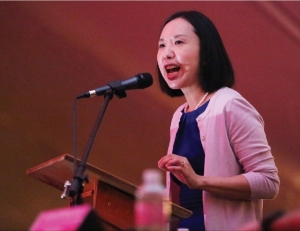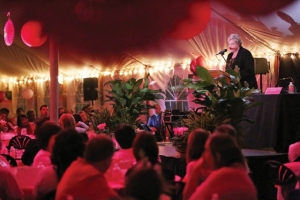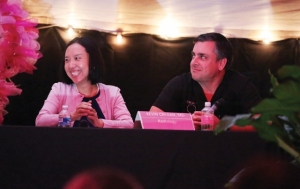50 Shades of Pink: Hospital event puts focus on breast cancer awareness
By Phyllis Moore
Published in News on November 3, 2016 11:05 AM

News-Argus/CASEY MOZINGO
Dr. I-Wen Chang from Southeastern Medical Oncology speaks during "50 Shades of Pink," the annual Wayne Memorial Hospital breast cancer awareness event held Wednesday night

News-Argus/CASEY MOZINGO
Guest speaker and breast cancer survivor Bonnie Gray tells her story during "50 Shades of Pink," the annual Wayne Memorial Hospital breast cancer awareness event held Wednesday night in a tent on the front lawn of the hospital. The purpose of the event is to discuss screening, diagnosis and treatment for breast cancer.

News-Argus/CASEY MOZINGO

News-Argus/CASEY MOZINGO
Dr. I-Wen Chang from Southeastern Medical Oncology and Dr. Ben Eskra answer questions from the audience during the annual Wayne Memorial Hospital breast cancer awareness event held Wednesday night in a tent on the front lawn of the hospital. The purpose of the event is to discuss screening, diagnosis and treatment for breast cancer.
Bonnie Gray -- a wife, mother, grandmother and nurse -- had a very demanding life in 2006.
"I thought I couldn't put one more thing on my plate," she said. "Then along came breast cancer."
She shared her journey with "inflammatory breast cancer" that included chemotherapy, surgery and later participation in a clinical trial.
"I'm living proof that you do not have to have a lump to have breast cancer," she told the capacity crowd at "50 Shades of Pink" Wednesday night on the front lawn of Wayne Memorial Hospital.
Blessed by medical advances, a knowledgeable medical team and the support of family and friends, she is in her 10th year as a survivor, she said, offering up three important life lessons learned.
"No. 1, never ignore changes in your body," she said. "Two, while you're young and healthy make sure that you purchase all the life insurance that you think you may ever need. It's harder to get after cancer.
"Three, don't sweat the small stuff and most of it is small stuff except where we're going to spend eternity."
This marked the third year for the breast cancer awareness event at the hospital. It was rescheduled from last month, interrupted by the hurricane.
Vivian Vinson of Goldsboro had enjoyed the previous year's so much, she made it a point to attend again, with several family members, she said.
"Every time they offer a seminar here, I'm here, because I believe in prevention," she said.
Her cousin, Edith Ward, got a callback for a second mammogram two years ago that gave her pause.
"They found (the breast) had calcified. The doctor told me that actually may be cancer but when I went to get the biopsy, everything was fine," she said.
While her last two mammograms were fine, the 75-year-old admitted she has "said a few extra prayers" in anticipation of a test scheduled for later this month.
"I do my mammogram every year," said Ms. Vinson, who is 77.
Geraldine Brown and her sister, Joyce Parks, have been through more than their share of health scares.
"She had (breast cancer) when she was 45, I had it at 49," Ms. Brown said. "She had it again at 63. And then our mother had it at 84 and then she had melanoma at 90.
"I have had basal cancer on top of my head and on the side of my nose. And she (Joyce) had it on the opposite side of her nose."
Ms. Brown still gets regular checkups, including the recently introduced 3-D mammogram, which she said was a great stress reducer.
"The doctor talked to me after," she said. "The waiting (for results) is tough."
The siblings said their faith has helped them through any health setbacks.
"What keeps me going? God keeps me going," Ms. Parks said.
"Same with me," chimed in Ms. Brown. "And also friends, encouragement, and these events are very helpful, too. They have come so far with cancer treatments and technology.
"You can't change a thing. The only thing, you have got to keep pressing on and just get up and thank the Lord you reached another day."
Janice Smith was diagnosed with breast cancer in 2007, when her son was 8 years old.
Except for her husband and son, she chose not to tell her family "because the 'c word' frightens people," she said.
"Mine was really early stage," she said. "No chemo, no radiation. It was not even staged, but I did get a mastectomy because it was scattered (all over). I have been doing good ever since."
Julie Tolbert's jolting news came in 2010. She had just started a new job and didn't have a primary care physician.
Within a four-week period, she was diagnosed and ushered through treatments and surgery.
"The day before my surgery, I had to speak at my grandmother's funeral," she said, adding that she never told the matriarch. "So what she knows is that her granddaughter was fine when she passed."
Dr. Jason Boyd, of Southeastern Medical Oncology Center, or SMOC, served as master of ceremonies at the event, which included informational booths set up by several area health care providers and specialists sharing about recent a
Dr. Kevin Cregan of Wayne Radiologists, one of two local offices --the other being the hospital-- which recently acquired equipment to do 3-D mammography, talked about the advancements of mammography, introduced in the mid-1980s.
Mammograms have drastically lowered the death rate due to the disease, he said. The 3-D digital version is also decreasing the number of callbacks for a second screening, he said.
Every case of breast cancer is unique, Dr. I-Wen Chang of SMOC said.
And while there are certain risk factors -- age of a woman's first period and first pregnancy as well as other things they cannot control, like age and gender -- there is one thing they can control.
"Weight," she said. "We know that being overweight and (being) obese after menopause is a major risk for breast cancer," she said, giving a brief tutorial on how to Google BMI, or body mass index.
"What can we do to reduce our breast cancer risk?" she asked. "No. 1 is please keep a healthy body weight. Try to keep BMI below 30. Exercise regularly. Physical activity has been proven to reduce breast cancer risk.
"Exercise is not a therapy. It's not a treatment. Exercise is part of life."
The evening's other speaker, Dr. Ben Eskra, of Eskra Plastic Surgery, talked about the merits and options of reconstruction after mastectomy.
